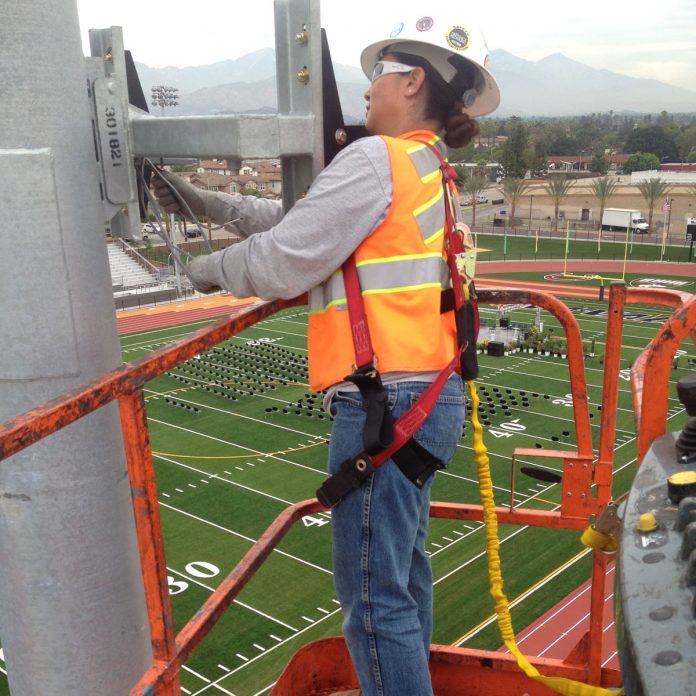Local Union 569 Electrician Cristina Marquez and Local Union 229 Ironworker Xenia Miranda might never meet but say similar things about their work: they are proud to be women in a male-dominated field and want more women to explore an alternative path to four years in college or an entry-level job.
Zooming in during a National City Round Table event on economic opportunities in the South Bay region, Marquez introduces herself as an Outreach Coordinator for San Diego’s Electrical Training Institute and grins from ear to ear as she shows off a photo from a job site with an all-female crew, says women of any age can embark on an apprenticeship program in the electrical field.
“Becoming a journeyman was scary, I felt like I couldn’t make mistakes but I learned, it happens,” Marquez said.
She says there is no age limit to the apprenticeship program, that she had an unused degree from San Diego State University and was parking cars for a living in Las Vegas when a friend told her about being an apprentice. She has since carved out a role for herself where she both guides women through their first steps into the program and offers wisdom to those out in the field.
“When I see women letting guys carry their ladders for them or anything like that, I stop them. I take them aside, tell them to pull their own weight because it reflects on me as well,” Marquez said.
Working to overcome any perceived physical weakness, she also advises apprentices to be emotionally stronger than any bullies in the workplace.
“At some point, you have to dig deep and decide if this is something you want to do for the rest of your life. You want to work with your hands? You want to be the one actually building San Diego and Imperial Valley? You have to let them know you’re a strong female and if it bothers them, too bad,” Marquez said.
Miranda, working alongside fellow Local 229 Ironworkers to deliver donated personal protection equipment at a National City event said she believes it is really hard for any woman to earn a living wage through a single job and thinks the challenges of being a woman in construction are worth the benefits.
“I don’t know many people who are successful at providing for families if they’re female, single, a first-time college grad, a person of color—its really hard to make it without some sort of formal training, something to move people along so they aren’t trapped in the workforce at entry level,” Miranda said.
Miranda, who became an ironworker in 1982 when she was 18 and has worked as an Ironworker for almost 38 years said she sometimes stop to chat with women “in the parking lot of a grocery store or wherever,” asks them if they’re happy with their lives— often, they tell her they’re struggling.
Unions provide a lot for under-represented groups, she said, a quality of life some women would not otherwise have.
For example, she said, Ironworkers have an extended six-month, paid maternity leave program that surpasses California’s unpaid Family and Medical Leave Act.
That program, and others which directly benefit women in trades are possible, she believes, because of women who band together and advocate for change.
“There’s a national Women Build Nations conference, it’s been going on for years now, and last year R.B.G. (U.S. Supreme Court Justice Ruth Bader Ginsburg) addressed us in our conference which was really cool.
Women come from all the different trades, different industries, even different countries. It informs, gives training, gives resources- how to be more productive in your union or your community, which to me is where it really starts,” Miranda said.
Marquez said the International Brotherhood of Electrical Workers Women’s Committee has continued to meet throughout the COVID-19 pandemic, virtually, talk to each other and provide support and plan ways to bring more women into their field.
“There’s only maybe 2% out of 530, like 12 to 15 of us that are women but we are still above the national average,” Marquez said.
Miranda cites similar statistics, saying “the national percentage of women in the building trades is not very high, I think between 3 to 4%, and nearly all the trades are trying to train or retain women in construction”.
Marquez sums up why she wants to see more women in the construction trades.
“Once you learn these skills, nobody can take it away from you. Being able to build things with your hands or driving by a building and saying ‘I helped build that’ is amazing,” Marquez said.















